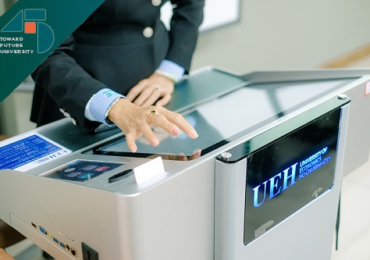E-Banking Service Quality and Customer Satisfaction in the Mekong Delta Region
5 January, 2024
Developing electronic banking services is an important aspect of the business activities of commercial banks in the digital era. This research by the author of Ho Chi Minh City University of Economics (UEH) conducted a survey of 544 customers in the Mekong Delta Region to clarify the impact of E-banking system service quality to customer satisfaction. The analytical results from the partial least squares structural model (PLS-SEM) demonstrate that E-banking service quality has a positive impact on customer satisfaction in the Mekong Delta Region.
Today, information technology and the Internet have helped banks build effective global multi-channel integrated distribution strategies from communications, marketing, sales, customer care and service provision and so on. E-banking services are considered an inevitable trend and a competitive advantage for commercial banks in the context of international competition and integration. Besides, the increasing number of Internet users has created opportunities for the banking industry to develop E-banking services. According to the website that compiles and provides free Digital Marketing reports worldwide (Datareportal.com), Vietnam has 77.93 million Internet users at the beginning of 2023, accounting for 79.1% of the total population. This has changed customers’ consumption behaviors from the way they search for information, plan, register and use services to evaluate services. However, when using E-banking services, customers often concern the security of personal information. Therefore, for E-banking services, customer satisfaction always plays an important role in business activities, helping commercial banks retain old customers, attract potential customers and contribute to the growth of service revenue and the achievement of the competitive advantages.
The Conference announcing Planning and Investment Promotion in the Mekong Delta for the period 2021-2030 with the theme “New thinking – New vision – New opportunities – New values” held on June 21, 2022 in Can Tho City, under the chairmanship of the Prime Minister, emphasized: The Mekong Delta Region has a particularly important strategic position and role in terms of economy, culture, society, environment, defense, security and foreign affairs of the whole country. Therefore, the development of the commercial banking system in general as well as E-banking services in particular will bring benefits to both customers, banks and provinces in the Mekong Delta Region, contributing to promoting and supporting the future regional economic development area, contributing to fulfilling the overall goal of the Government’s non-cash payment project for the 2021-2025 period along with the National Digital Transformation Program to 2025, with a vision to 2030; concurrently, creating opportunities for banks to innovate their business models, further promoting the development and the improvement of personal financial services so as to be adapted to the new situation.
Nevertheless, when implementing E-banking services, the commercial banks in the Mekong Delta region in particular as well as the country in general face many challenges listed as improving customer satisfaction, retaining old customers, and attracting potential customers, contributing to service revenue growth and gaining competitive advantage and so on. Besides, when using E-banking services, customers often have concerns regarding security and confidentiality of personal and financial information policies, reliability and stability of services, accessibility and support from the bank and so on. For the above reasons, the study “The impact of E-banking service quality on customer satisfaction: The evidence from commercial banks in the Mekong Delta Region” was conducted.
Upon considering the relationship between E-banking service quality and customer satisfaction in the Mekong Delta Region, research results indicate that the p-values of the t-test are equal to 0.000 < 0.05 and the impact coefficient normalized by 0.731. This proves that E-banking service quality has a positive impact on customer satisfaction in the Mekong Delta Region. This result is completely similar to that of the previous studies on the relationship between E-banking service quality and customer satisfaction (Al-Hawary & Al-Smeran, 2017; Hammoud et al., 2018; Shankar & Jebarajakirthy, 2019; Sewaka et al., 2023; Ul & Awan, 2020). Besides, the fact that the adjusted R-squared coefficient is 0.534 indicates that E-banking service quality explains 53.4% of the variation in customer satisfaction. On the other hand, the fact that the value of coefficient f2 of E-banking service quality is 1.148 (greater than 0.35) presents that E-banking service quality has a strong impact on customer satisfaction (Cohen, 1988).
Besides, the research results introduce that all four factors, including: reliability, responsiveness, security and efficiency, have a positive influence on the quality of E-banking services in the Mekong Delta region. In particular, the strongest impact on e-banking service quality is responsiveness (0.475), followed by reliability (0.433), security (0.209) and finally efficiency (0.171) as the least impact on the quality of E-banking services. At the same time, this study confirms that E-banking service quality has a strong, positive impact on customer satisfaction in the Mekong Delta region (0.731). The hypotheses in the research model are all supported at the 5% statistical significance level.

The evaluation result regarding PLS-SEM model analysis
The relationship between reliability and customer satisfaction with quality reported by E-banking in the Mekong Delta Region is completely consistent with the arguments in the literature review. These findings indicate that customers who are highly engaged in E-banking services expect more reliable services and higher standards of privacy for personal information as well as security for their financial transactions. The findings indicate that privacy and security play an important role in building trust and satisfaction with E-banking services. Customers are totally concerned about the privacy of personal information and the safety of financial transactions when using online banking services. When customers see that E-banking services meet these expectations, they will form more trust and satisfaction with E-banking services.
Responsiveness is the willingness and the readiness to support and to provide quick service to customers, demonstrated through customer care and support during the process of performing electronic transactions. This is an essential factor for banks to attract more customers and to achieve long-term success (Sathiyavany & Shivany, 2018). Therefore, when customers receive timely and complete feedback and support from E-banking service providers, their trust in commercial banks will increase, making them more satisfied with service quality. The research results on the impact of E-banking service quality on customer satisfaction in the Mekong Delta region are completely similar to that of the previous studies.
In terms of E-banking services, in accordance with the study by Parasuraman et al. (1985), the effectiveness of the service is reflected in the speed of implementation and processing of E-banking transactions. This is one of the factors that determine the level of customer satisfaction. Typically, slow processing and response speeds in electronic transactions will lead to delays in service delivery and leave customers uncertain whether the transaction will be completed or not (Khan, 2017). Therefore, transaction speed has a positive impact on satisfaction and affects customer loyalty (Ul & Awan, 2020). Once again, the results of this study confirm that the speed of implementing and processing electronic transactions quickly will increase customer satisfaction as mentioned in the previous studies. Besides, the effectiveness of the service is demonstrated through its ease of use. Therefore, banks are constantly striving to provide easy-to-use, interactive services on the website to minimize the time spent on each online transaction (Almansour, B., & Elkrghli, S., 2023; Hussien & Abd El Aziz, 2013; Le, 2022; Sikdar & Makkad, 2015).
In recent years, developing business products based on technology platforms has become a common trend for commercial banks in Vietnam, especially during the COVID-19 epidemic period that caused many places to be blocked. Therefore, in order to maintain business operations, most banks in the Vietnamese market have encouraged users to use services via the Internet. Therefore, this research on the impact of E-banking service quality on customer satisfaction in the Mekong Delta region will contribute to affirming and strengthening the relevant theories in the field of E-banking services. Besides, the research brings additional meaning to the literature that CMR theory can be applied to support within the research framework of E-banking services. For the Mekong Delta Region, the project contributes to promoting and improving the quality of E-banking services in the region, contributing to fulfilling the overall goal of the Government’s non-cash payment project for the 2021-2025 period along with the National Digital Transformation Program to 2025, with a vision to 2030; concurrently, creating opportunities for banks to innovate their business models, further promoting the development and the improvement of personal financial services to be adapted to the new situation.
Author group: MSc. Nguyễn Thị Ánh Ngọc, MSc. Đoàn Thị Thanh Hòa, MSc. Nguyễn Thị Diễm – Faculty of Banking Finance, Vĩnh Long Branch – University of Economics HCMC (UEH).
This is an article in the series of articles spreading research and applied knowledge from UEH with the “Research Contribution For All – Nghiên Cứu Vì Cộng Đồng” message, UEH cordially invites readers to watch the next Newsletter ECONOMIC No #105.
News, photos: Author Group, UEH Department of Marketing and Communication






































